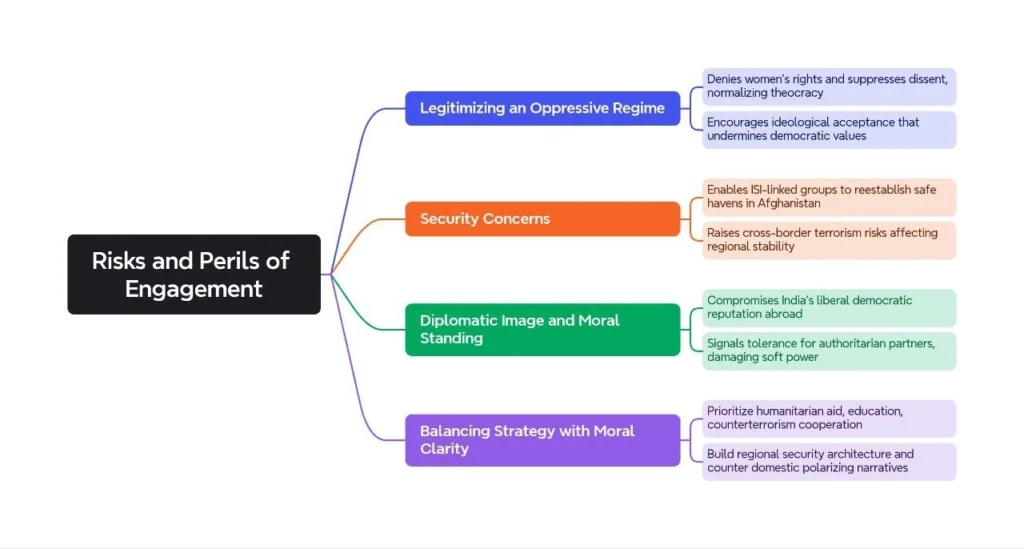Paper: GS – II, Subject: International Relations, Topic: India and Its Neighborhood, Issue: India’s evolving relationship with the Taliban.
Context:
Amir Khan Muttaqi’s (Afghanistan Foreign minister) visit marks India’s strategic shift toward engaging the Taliban, reflecting a pragmatic move to safeguard security, regional influence, and counter China–Pakistan dynamics.
Key Highlights:
Historical Context of the Taliban:
- Origins and Ideology: The Taliban emerged in the 1990s from refugee camps and Wahhabi-influenced madrasas in Pakistan. Guided by Mullah Omar, it sought to impose a rigid interpretation of Islamic law.
- Rule (1996–2001): Their regime banned girls’ education, restricted women’s rights, persecuted minorities (notably the Hazaras), and destroyed cultural heritage like the Bamiyan Buddhas.
- Links to Terrorism:
The Taliban’s close alliance with al-Qaeda and Osama bin Laden made Afghanistan a global hub of terror, culminating in the 9/11 attacks. - Collapse and Return: After their ouster in 2001 by the Northern Alliance (with U.S. backing), the Taliban regrouped in Pakistan under ISI protection, eventually retaking Kabul in 2021 now promising “moderation” but showing little genuine reform.
Historical Context of India–Afghanistan Relations:
- Civilisational Linkages: India and Afghanistan share deep cultural, linguistic, and trade ties dating back to the Silk Route and shared Buddhist heritage.
- Eg: The Kabul–Gandhara–Taxila corridor was a conduit for Indo-Greek and Buddhist exchanges.
- Diplomatic Support: Post-1947, Afghanistan was the only country to oppose Pakistan’s UN membership, highlighting early political affinity with India.
- Developmental Engagement: India invested over $3 billion in reconstruction after 2001 building the Salma Dam, Afghan Parliament, and Zaranj–Delaram Highway, cementing goodwill.
- Humanitarian Assistance: Post-2021 Taliban takeover, India maintained “people-centric engagement” providing 50,000 tonnes of wheat, medicines, vaccines, and scholarships.
- Current Relevance: Despite non-recognition of the Taliban regime, India has adopted a de facto engagement policy through humanitarian channels and regional dialogues (e.g., Moscow Format, Heart of Asia).
Risks and Perils of Engagement:

India’s engagement with the Taliban tests its strategic maturity, requiring a balance between regional interests and moral values to avoid legitimizing extremism while upholding democratic and pluralist principles.
https://www.thehindu.com/opinion/op-ed/the-perils-of-engaging-with-the-taliban/article70205387.ece
La Excellence IAS Academy, the best IAS coaching in Hyderabad, known for delivering quality content and conceptual clarity for UPSC 2025 preparation.
FOLLOW US ON:
◉ YouTube : https://www.youtube.com/@CivilsPrepTeam
◉ Facebook: https://www.facebook.com/LaExcellenceIAS
◉ Instagram: https://www.instagram.com/laexcellenceiasacademy/
GET IN TOUCH:
Contact us at info@laex.in, https://laex.in/contact-us/
or Call us @ +91 9052 29 2929, +91 9052 99 2929, +91 9154 24 2140
OUR BRANCHES:
Head Office: H No: 1-10-225A, Beside AEVA Fertility Center, Ashok Nagar Extension, VV Giri Nagar, Ashok Nagar, Hyderabad, 500020
Madhapur: Flat no: 301, survey no 58-60, Guttala begumpet Madhapur metro pillar: 1524, Rangareddy Hyderabad, Telangana 500081
Bangalore: Plot No: 99, 2nd floor, 80 Feet Road, Beside Poorvika Mobiles, Chandra Layout, Attiguppe, Near Vijaya Nagara, Bengaluru, 560040
